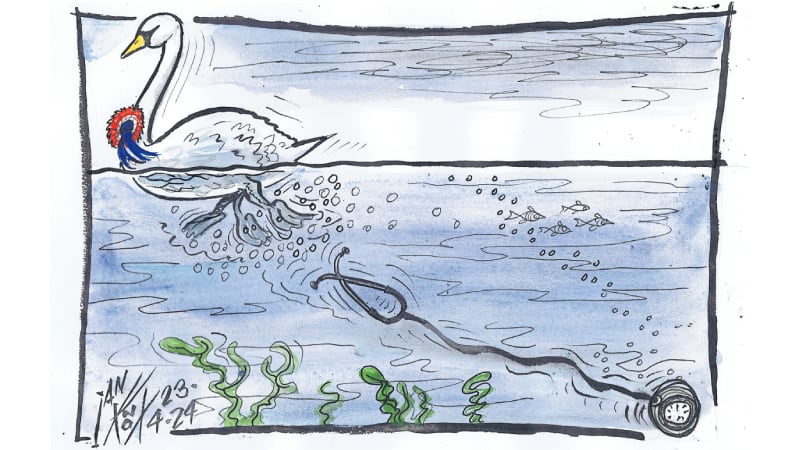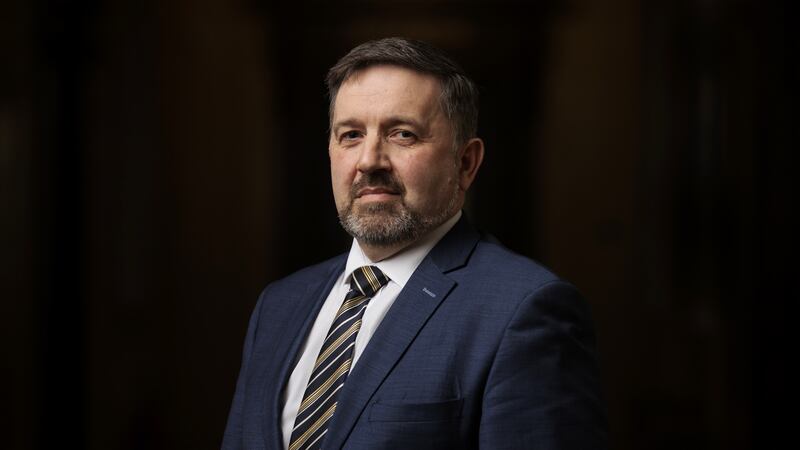Fr Patrick McCafferty (May 2) described my article, published in The Bulwark, as representing ‘a theology based on ignorance…’. I understand that he felt offended because my criticisms of the Mass violated what he considers to be ‘the holiest of all that is holy’.
While my differences with him are theological, not personal, his words regarding Protestant theology being ‘no theology’ and ‘based on ignorance’ warrant a response.
Contrary to Fr McCafferty’s claim, the Word of God teaches us that we are not ignorant, but rather empowered by its truth. Writing almost 2,000 years ago St John wrote, that the divine purpose of Scripture, was that his readership: “might know that ye have eternal life” (1st John 5:13). This certainty, assurance of eternal life, arises from a faith in Christ alone, as He is revealed in the scriptures. Therefore, St John in the same passage writes without compromise: “He that hath the Son hath life, and he that hath not the Son of God hath not life” (1st John 5:12). Christ is the essence of the Gospel, the good news for a fallen and broken world.
In describing the Mass as ‘the holiest of all that is holy’ and in affirming his faith in ‘the real presence of the Risen Christ in the unleavened bread and wine’, Fr McCafferty concedes one of the fundamental distinctions between Protestantism and Catholicism. The Christ of the Bible is not: “In this divine sacrifice of the Mass... contained and offered in an unbloody manner” (Catechism of the Catholic Church 1367). He is alive at the Father’s right hand, serving as our Great High Priest, hearing our confessions, forgiving our sins, having offered Himself once for sin. It is Christ alone, who is the holiest of all that is holy, not the unleavened bread and wine. So Christ was once offered to bear the sins of many: and unto them that look for him shall he appear the second time without sin unto salvation.” (Hebrews 9:28). Therefore, what the Protestant Churches call ‘The Communion Feast’ or ‘The Lord’s Supper’, is not an act of offering the literal Christ, but of commemoration and rededication.
Fr McCafferty refers to John 6 where Christ spoke of faith being eating His flesh and drinking His blood. Throughout His ministry Jesus often spoke in metaphors: “I am the door”; “I am the way”; “I am the light of the world”. Famously Nicodemas thought the new birth was entering his mother’s womb a second time. Christ, however, was teaching that we all need a radical inner transformation, the life of God in the soul of man: “For God so loved the world that he gave His only begotten son that whosoever believeth in him should not perish but have everlasting life.” (John 3:16). It is this question, the reality of our faith in the living Christ, our preparation for eternity, our assurance and peace, which is the most basic of all. “Ye shall know the truth and the truth shall make you free.” (John 8:32).
REV PETER McINTYRE
Clogher, Co Tyrone
Shock at what is happening to leading neurologist
My name is Christine Lynch and I have multiple sclerosis. I am a patient of Dr Watt and am shocked by what is happening to this outstanding neurologist. I have received nothing but the best of care from him since 2004.
I notice that nothing specific about Dr Watt’s apparent failure in treatment of patients is mentioned anywhere. And that apparently only a small number of patients are affected – around 49 I think? The small area of practice that Dr Mark Mitchelson referred to could be Dr Watt’s use of LDN as a treatment for MS and other neurological conditions.
Dr Watt is one of the few [perhaps the only] consultant in Ireland that is prepared to prescribe LDN (low dose naltrexone) as a treatment for multiple sclerosis.
In 2005 I asked Dr Watt if he would prescribe this drug for me. He said “yes” and if it didn’t work that I could go onto the usual disease modifying drugs which are standard treatment for relapsing/remitting MS. LDN stopped progression of my symptoms after I started it in November 2005.
LDN is a generic drug that costs very little. Disease modifying drugs on the other hand cost around £10,000 per year.
CHRISTINE LYNCH
Belfast BT9
Barnier in dark over ‘unionist culture’
DUP leader Arlene Foster’s assertion that the EU’s chief Brexit negotiator Michel Barnier does not understand ‘the wider unionist culture of Northern Ireland’ can be easily remedied but may not make for comfortable reading by unionists. Apart from viewing, from a safe distance, 11th night Orange Order cultural bonfires incinerating Irish, Polish and Papal flags, a visit to some of the larger housing areas in Derry and Belfast would surely give Mr Barnier and his EU entourage a wider view of social ‘unionist culture’.
Plans by the Stormont executive to fund shared education between Catholics, Protestants and those of other faiths, were cited as an unacceptable reality that of 291 schools in Northern Ireland in the 2011-12 school year, 180 had no Protestant children and 111 had not a single Catholic on their roll. Since the foundation of the Northern state a policy of segregation of communities was rigorously enforced in line with the policy of gerrymandering to ensure continuation of unionist hegemony in predominantly nationalist areas. Indeed, in excess of 90 per cent of the population in the north lives in denominationally segregated housing.
Perhaps Mrs Foster may wish that Mr Barnier stay ignorant of unionist culture.
TOM COOPER
Dublin 2
Multi-optional voting
The UK’s 2016 referendum on its relationship with Europe could have offered: (a) in the EU; (b) in the European Economic Area; (d) under the World Trade Organisation.
And today, a ‘meaningful’ vote in parliament or a referendum could suggest: (a) in the EU; (b) in a Theresa May-style ‘customs partnership’ ; (c) as per the maximum facilitation formula; (d) under the WTO.
And to be ‘meaningful’ for (almost) everyone, a vote must be multi-optional.
For many people in or
children of mixed relationships, the 1991 referendum in Croatia – ‘Are you Serb or Croat?’ – was a dangerous nonsense.
For many supporters of PR the UK’s 2011 referendum on the electoral system was also nonsensical, like asking a vegetarian – beef or lamb?
The 2014 Scottish referendum – Independence or status quo? – was a third nonsense – the winning option was ‘devo-max’, but nobody voted for it. They couldn’t, it wasn’t on the ballot paper.
In summary, if the subject is complex or controversial, the vote in parliament or any referendum can only be meaningful, for everyone, if it is multi-optional and, ideally, preferential.
PETER EMERSON
Belfast BT14
Ireland’s destiny
The EU’s chief negotiator Michel Barnier flits about our borders with the patronising air of the little well-off boy who owns the ball but will not allow the ragamuffins to play with it unless they show deference, comply with his rules and permit him to win every game.
Taoiseach Leo Varadkar, Tanaiste Simon Coveney and their cohorts would appear to be fulfilling all his requirements with their beholden diplomacy. Should the time arrive when all fetters are finally rent in twain, will it be the Irish Nation’s destiny once again to be a province, not of Britain but of Europe?
WILSON BURGESS
Derry City







